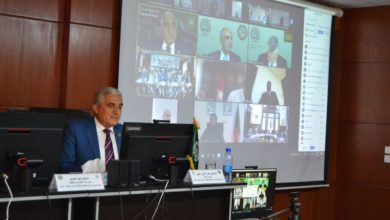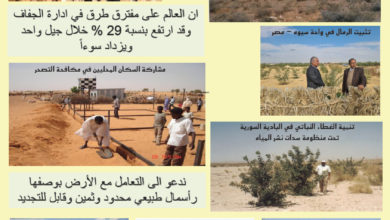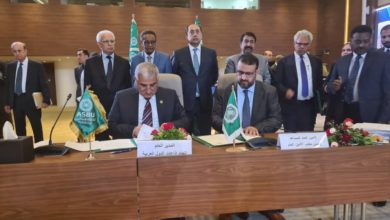ACSAD and the Omani Ministry of Agriculture and fisheries wealth in a training course on “the seeds production techniques of crops tolerant to drought and salinity.”
The Arab Center for the Studies of Arid Zones and Drylands ACSAD Organization held today a training course on “the seeds production techniques of crops tolerant to drought and salinity.”; in cooperation with the Omani Ministry of Agriculture, Fisheries Wealth, and Water Resources in the Oman Sultanate to raise technical capabilities for many agricultural engineers in the Sultanate.

His Excellency, the Director-General of ACSAD organization, emphasized in a speech during the course opening via video conference technology, this training course on “the seeds production techniques of crops tolerant to drought and salinity” comes from the importance of obtaining the crops seeds tolerant to drought, which is increasing year by another; after the climate changes had become like a reality in terms of low groundwater levels, high temperatures, and the amount rainfall decrease.
He also said, “It is imperative for us as agricultural research centers in the Arab world and the Arab Center ACSAD to work on implementing the research to rationalize water uses, develop irrigation methods and upgrade its efficiency, producing of early-maturing and drought-resistant varieties and water harvesting. He confirmed that this is what ACSAD works on for many years. It produced plenty of drought-resistant varieties were developed, adopted 77 drought-resistant varieties in 12 Arab countries, constructed dozens of dams in the Arab world for rainwater harvesting, and developed new methods for modern irrigation to preserve the available water in agriculture.
Dr. Obaid also praised the cooperation joint between ACSAD and the Sultanate of Oman, which extends long years of joint work resulting in adopting four varieties of wheat and three of barley, establishing an integrated database of the natural pasture locations in the Sultanate. The implementation of a training course on the” Methods of cultivating and serving fallen-leaves fruit trees and olives” in the presence of 23 trainers from the engineers, agricultural technicians, and farmers in Nizwa state in 2020. In addition to sending 1250 seedlings of olive, figs, and pears in 2019-2020. Omani experts have also actively contributed to ACSAD’s efforts to combat the red palm weevil insect.
The course program, which lasts for four days, includes several axes: nanotechnology in bearing the water stresses, radiology use technology in developing new varieties and strains, remote sensing technologies, and biotechnologies in addition to climate changes topic and soil methods, genetic improvement for crops, agricultural treatments, and fertilization.
It is planned for ACSAD to implement a second training course on ” Improving the quality of palm production.” in July 2021. it trains the agricultural engineers on the newest methods and techniques of palm cultivation and improved production quality. Moreover, there are horizons for cooperation in the various agricultural, plant, and animal fields to develop agricultural production and serve the Omani farmers.



